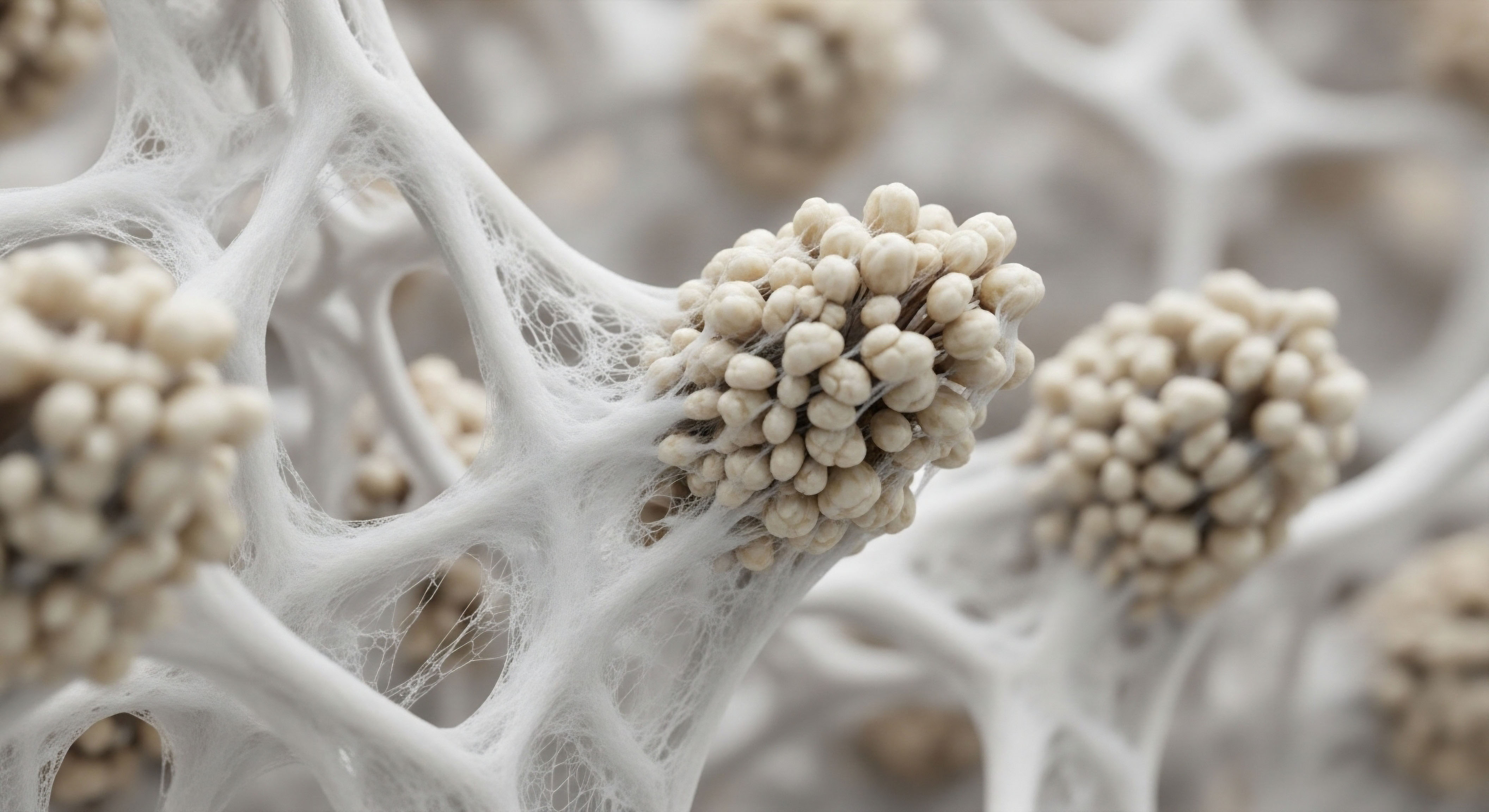

Fundamentals
Many individuals experience a subtle yet persistent shift in their overall well-being, a feeling of diminished vitality that often defies simple explanation. Perhaps you notice a persistent lack of restorative sleep, a recalcitrant weight gain despite diligent efforts, or a general sense of unease that wasn’t present before.
These experiences are not merely isolated occurrences; they frequently signal deeper biological conversations happening within your body, particularly concerning your intricate hormonal systems. Understanding these internal communications, and how they are influenced by the very sustenance you consume, represents a powerful step toward reclaiming your optimal function.
Your body operates through a sophisticated network of chemical messengers known as hormones. These substances, produced by various glands, travel through your bloodstream to distant tissues, orchestrating a vast array of physiological processes. Consider them as the body’s internal messaging service, transmitting vital instructions that govern everything from your mood and energy levels to your metabolic rate and reproductive capacity.
When these messages are clear and precise, your systems operate with seamless efficiency. However, when the signaling becomes disrupted, even subtly, the effects can ripple throughout your entire physiology, manifesting as the very symptoms you might be experiencing.
Hormones act as the body’s essential messengers, guiding countless biological processes and significantly influencing overall well-being.

The Endocrine System’s Core Function
The endocrine system, a collection of glands that produce and secrete hormones, functions as a master regulator of bodily processes. Key players include the thyroid gland, which governs metabolism; the adrenal glands, responsible for stress response; and the gonads (testes in men, ovaries in women), which oversee reproductive and sexual health.
Each gland releases specific hormones that bind to receptors on target cells, initiating a cascade of biochemical events. This intricate dance of production, release, and reception maintains physiological balance, a state known as homeostasis.
Nutritional interventions play a direct and profound role in supporting or disrupting this delicate hormonal equilibrium. The building blocks for hormone synthesis, the cofactors required for enzymatic reactions, and the signaling molecules that modulate receptor sensitivity all originate from your diet.
Without the appropriate nutritional foundation, the body struggles to produce adequate hormone levels or to respond effectively to existing ones. This foundational understanding sets the stage for appreciating how specific dietary choices can either optimize or compromise your endocrine health.

How Nutrients Influence Hormonal Synthesis
The creation of hormones within the body is a complex biochemical process requiring a steady supply of specific nutrients. For instance, steroid hormones, including testosterone, estrogen, and progesterone, are derived from cholesterol. This means that adequate, healthy dietary fat intake is not merely beneficial; it is absolutely necessary for the production of these vital messengers. Beyond cholesterol, the conversion steps in steroidogenesis depend on various vitamins and minerals.
- Vitamin D ∞ This fat-soluble vitamin, often considered a pro-hormone itself, plays a significant role in the synthesis of steroid hormones and influences numerous endocrine pathways.
- Zinc ∞ An essential mineral, zinc is a cofactor for many enzymes involved in hormone production, including those in testosterone synthesis.
- Magnesium ∞ This mineral is involved in over 300 enzymatic reactions, many of which are directly or indirectly related to hormonal regulation and cellular energy production.
- B Vitamins ∞ The B-complex vitamins, particularly B5 and B6, are vital for adrenal function and the synthesis of neurotransmitters that influence hormonal release.
A deficiency in any of these critical nutrients can impede the body’s ability to manufacture hormones efficiently, leading to suboptimal levels even when the glands themselves are structurally sound. Conversely, providing these nutritional precursors and cofactors can support robust hormone production, helping to restore balance and alleviate symptoms associated with insufficiency.


Intermediate
Moving beyond the foundational aspects of hormone synthesis, we consider how specific nutritional interventions directly influence the intricate signaling pathways that govern endocrine function. Hormones do not simply exist in isolation; they participate in complex feedback loops, akin to a sophisticated thermostat system regulating temperature. Nutritional inputs can fine-tune this system, either enhancing the clarity of hormonal messages or introducing static that disrupts their reception.

Dietary Fats and Steroid Hormone Metabolism
The quality and type of dietary fats consumed exert a profound influence on the production and metabolism of steroid hormones. These hormones, including testosterone, estrogen, and progesterone, are synthesized from cholesterol. A diet rich in healthy fats, such as monounsaturated and polyunsaturated fats found in avocados, nuts, seeds, and fatty fish, provides the necessary raw materials. Conversely, excessive intake of highly processed fats or trans fats can disrupt cellular membrane integrity, potentially impairing receptor function and cellular communication.
Consider the male endocrine system, where testosterone plays a central role in vitality and metabolic health. In the context of Testosterone Replacement Therapy (TRT), men often receive weekly intramuscular injections of Testosterone Cypionate. While this exogenous administration directly addresses low testosterone levels, nutritional support remains paramount.
Adequate intake of dietary cholesterol and healthy fats supports the body’s intrinsic ability to synthesize other vital steroid hormones and maintain overall metabolic health. Furthermore, certain fatty acids influence the activity of enzymes involved in testosterone conversion, such as aromatase, which converts testosterone to estrogen.
The type and quality of dietary fats significantly impact the body’s ability to produce and effectively utilize steroid hormones.

Protein Intake and Peptide Hormone Regulation
Protein consumption is equally vital, particularly for the regulation of peptide hormones and growth factors. Peptides, smaller chains of amino acids, act as signaling molecules that influence various physiological processes, including growth, metabolism, and cellular repair. Adequate protein intake ensures a sufficient supply of amino acids, the building blocks for these crucial messengers.
For individuals undergoing Growth Hormone Peptide Therapy, such as those utilizing Sermorelin or Ipamorelin / CJC-1295, optimizing protein intake is essential to support the body’s enhanced capacity for tissue repair and muscle protein synthesis.
For women, particularly those navigating peri-menopause or post-menopause, maintaining hormonal balance is a key objective. Protocols involving Testosterone Cypionate via subcutaneous injection and Progesterone aim to alleviate symptoms like irregular cycles, mood changes, and hot flashes. Nutritional strategies that support healthy protein metabolism and provide amino acid precursors can complement these therapies, aiding in the body’s adaptive responses and overall systemic resilience.

Does Gut Health Influence Hormonal Signaling?
The gastrointestinal tract, often referred to as the “second brain,” plays a surprisingly direct role in hormonal signaling. The gut microbiome, the vast community of microorganisms residing in your digestive system, influences the metabolism and excretion of hormones, particularly estrogens. A healthy and diverse microbiome supports the proper elimination of excess hormones, preventing their reabsorption and potential accumulation, which can contribute to hormonal imbalances.
Dietary fiber, found abundantly in fruits, vegetables, and whole grains, acts as a prebiotic, nourishing beneficial gut bacteria. This supports a balanced microbiome, which in turn aids in the proper detoxification and elimination of hormones.
Conversely, a diet lacking in fiber and rich in processed foods can lead to dysbiosis, an imbalance in gut flora, potentially impairing hormonal clearance and exacerbating symptoms of hormonal dysregulation. This interconnectedness highlights the importance of a holistic approach, where gut health is recognized as a fundamental pillar of endocrine well-being.
Consider the role of specific nutrients in modulating the Hypothalamic-Pituitary-Gonadal (HPG) axis, the central command system for reproductive hormones.
| Nutrient | Primary Hormonal Influence | Mechanism of Action |
|---|---|---|
| Omega-3 Fatty Acids | Testosterone, Estrogen, Cortisol | Reduce inflammation, improve cell membrane fluidity for receptor function, support prostaglandin synthesis. |
| Selenium | Thyroid Hormones | Essential for thyroid hormone synthesis and conversion (T4 to T3), acts as an antioxidant. |
| Iodine | Thyroid Hormones | Directly incorporated into thyroid hormones (T3 and T4) structure. |
| Chromium | Insulin, Growth Hormone | Enhances insulin sensitivity, supporting glucose metabolism and indirectly influencing growth hormone release. |


Academic
A deep exploration into how specific nutritional interventions influence hormonal signaling pathways necessitates a systems-biology perspective, acknowledging the intricate cross-talk between various endocrine axes and metabolic networks. Hormones do not operate in isolation; their actions are profoundly modulated by the cellular environment, which is, in turn, shaped by dietary inputs. This section dissects the molecular mechanisms by which macronutrients and micronutrients exert their influence, extending beyond simple synthesis to receptor sensitivity, gene expression, and feedback loop modulation.

Adipose Tissue as an Endocrine Organ
Adipose tissue, commonly known as body fat, is far more than a mere energy storage depot; it functions as a highly active endocrine organ, secreting a variety of hormones known as adipokines. These include leptin, which regulates appetite and energy expenditure, and adiponectin, which enhances insulin sensitivity.
Nutritional interventions that influence body composition directly impact the secretion profile of these adipokines, thereby modulating systemic hormonal balance. For instance, a diet high in refined carbohydrates and saturated fats can promote adipose tissue expansion and inflammation, leading to altered adipokine secretion and contributing to insulin resistance and hormonal dysregulation.
Conversely, dietary patterns that support healthy body composition, such as those rich in lean proteins, fiber, and unsaturated fats, can optimize adipokine profiles. This creates a more favorable metabolic environment, improving cellular responsiveness to hormones like insulin and supporting the delicate balance of sex steroids. The metabolic health of adipose tissue directly influences the peripheral conversion of androgens to estrogens via the aromatase enzyme, a process particularly relevant in both male and female hormonal balance.
Adipose tissue acts as a dynamic endocrine organ, with its health and function profoundly influenced by dietary composition.

Mitochondrial Function and Hormonal Responsiveness
The mitochondria, often termed the “powerhouses of the cell,” are central to cellular energy production and play a critical role in hormonal responsiveness. Many hormonal signaling pathways, including those involving thyroid hormones and steroid hormones, rely on robust mitochondrial function for optimal receptor binding and downstream signaling cascades.
Nutritional interventions that support mitochondrial health, such as those providing antioxidants (e.g. alpha-lipoic acid, CoQ10) and substrates for the electron transport chain, can enhance cellular energy status and improve hormonal sensitivity.
For individuals undergoing Testosterone Replacement Therapy (TRT), particularly men receiving Testosterone Cypionate, optimizing cellular energy production can enhance the therapeutic benefits. While exogenous testosterone addresses the supply, cellular responsiveness dictates the ultimate physiological impact. Nutritional strategies that reduce oxidative stress and support mitochondrial biogenesis can improve the efficiency with which target cells utilize available hormones. This includes ensuring adequate intake of B vitamins, magnesium, and sulfur-containing compounds, which are essential for various metabolic pathways within the mitochondria.

How Do Dietary Polyphenols Modulate Endocrine Receptors?
Beyond macronutrients, specific micronutrients and phytochemicals, particularly dietary polyphenols, exert significant influence on hormonal signaling at the receptor level and through enzymatic modulation. Polyphenols, found abundantly in fruits, vegetables, tea, and cocoa, possess diverse biological activities, including antioxidant and anti-inflammatory properties. Certain polyphenols, such as resveratrol and quercetin, have been shown to interact with estrogen receptors, acting as selective estrogen receptor modulators (SERMs) or influencing aromatase activity.
This interaction can have profound implications for hormonal balance, particularly in conditions where estrogen metabolism is a concern. For example, in men on TRT protocols who also use Anastrozole to manage estrogen conversion, dietary polyphenols might offer synergistic or complementary effects by influencing aromatase activity or estrogen receptor binding.
Similarly, for women managing peri-menopausal symptoms, specific polyphenols could contribute to a more balanced estrogenic environment. The precise mechanisms involve direct binding to receptors, modulation of enzyme activity (e.g. CYP450 enzymes involved in hormone metabolism), and regulation of gene expression related to hormone synthesis and degradation.
The table below illustrates the influence of select nutritional compounds on specific hormonal pathways:
| Nutritional Compound | Hormonal Pathway Influenced | Mechanism of Action |
|---|---|---|
| Indole-3-Carbinol (I3C) | Estrogen Metabolism | Promotes beneficial estrogen metabolite formation (2-hydroxyestrone) and supports detoxification pathways. |
| Sulforaphane | Androgen Receptors, Detoxification | Activates Nrf2 pathway, enhancing detoxification enzymes that clear excess hormones; may modulate androgen receptor activity. |
| Curcumin | Inflammation, Cortisol, Insulin | Reduces systemic inflammation, which can improve insulin sensitivity and modulate adrenal stress response. |
| Alpha-Lipoic Acid | Insulin Sensitivity, Thyroid Function | Potent antioxidant, improves glucose uptake in cells, supports mitochondrial function essential for thyroid hormone action. |
Understanding these deep molecular interactions provides a framework for truly personalized wellness protocols. It moves beyond generic dietary advice to a targeted approach that leverages specific nutritional compounds to modulate precise hormonal signaling pathways, ultimately supporting the body’s innate capacity for balance and vitality. This level of precision is what allows for a truly individualized approach to optimizing endocrine health.

References
- Fruhbeck, G. (2008). The Adipose Tissue as a Secretory Organ. Hormone and Metabolic Research, 40(7), 443-444.
- Picard, M. & McEwen, B. S. (2014). Mitochondria as mediators of stress-induced brain plasticity. Neuroscience & Biobehavioral Reviews, 47, 1-11.
- Singh, A. K. & Singh, R. (2018). Resveratrol ∞ A Potential Therapeutic Agent for Various Metabolic Diseases. Journal of Clinical & Diagnostic Research, 12(1), OE01-OE05.
- Brignardello, E. et al. (2016). Dietary Phytoestrogens and Their Role in Endocrine-Related Cancers. Nutrients, 8(12), 798.
- Guyton, A. C. & Hall, J. E. (2015). Textbook of Medical Physiology (13th ed.). Elsevier.
- Boron, W. F. & Boulpaep, E. L. (2017). Medical Physiology (3rd ed.). Elsevier.
- The Endocrine Society. (2018). Clinical Practice Guideline ∞ Testosterone Therapy in Men with Hypogonadism.
- Gottfried, S. (2013). The Hormone Cure ∞ Reclaim Your Body, Stop Weight Gain, Sleep Better, Feel Younger, and Live Longer. Scribner.

Reflection
As you consider the intricate connections between your daily nutritional choices and the profound symphony of your hormonal systems, a powerful realization begins to settle ∞ your body possesses an extraordinary capacity for balance and self-regulation. The information presented here is not merely a collection of facts; it is a framework for understanding your own unique biological blueprint. This knowledge serves as a compass, guiding you toward a more informed and intentional approach to your health.
Your personal journey toward vitality is precisely that ∞ personal. While scientific principles provide a robust foundation, the application of these principles must always be tailored to your individual physiology, your specific symptoms, and your distinct goals. This understanding empowers you to engage in a collaborative dialogue with clinical professionals, transforming abstract scientific concepts into actionable steps for your well-being.
The path to reclaiming optimal function begins with this deepened awareness, moving you from passive observation to active participation in your own health narrative.



